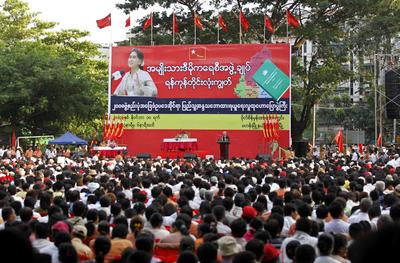The majority of commentary by the opposition and outside observers is centred on marginalising the political role of the military, specifically its representation in Parliament and in the executive; the military’s independence from civilian oversight; and its veto power within the amending formula. These conditions are seen as significant roadblocks to the continued development of a democratic system.
But efforts to curb the military’s powers, and ultimately the entire constitutional process, must be situated within the current political landscape. The emerging multi-polarity in Myanmar politics is slowly changing the power dynamics, interests and relationships between the various stakeholders involved, complicating attempts to construct a binary of pro-democracy opposition reformers on the one-hand and the military and their Union Solidarity and Development Party (USDP) allies on the other.
Constitutional reform is defined by two interconnected but distinct levels of interactions — that of substance and process.
Substance deals with specific clauses and issues within the Constitution, including the military’s political involvement; the judiciary’s role; the structure of the Union and the electoral system; and the apportionment and limitations on political powers. Process pertains to the pathways such undertakings will unfold along, including whether a number of rounds of gradual reform are taken or a complete overhaul (including potentially abolishing the current form) in one fell swoop.
The amending formula (Chapter XII) is the linkage between the two, particular the military’s veto power due to its 25 per cent representation in Parliament.
The opposition National League for Democracy (NLD) is a major proponent of comprehensive reform and has conducted several public opinion polls to demonstrate the widespread dissatisfaction with the Constitution. Removing the military from the political realm is a key priority, but Aung San Suu Kyi has also made overtures to the generals in an attempt to normalise their previously hostile relationship.
But with only seven representatives on the parliamentary review committee the NLD has a weak hand and must be willing to compromise with the USDP and the military, which combined comprise 77 of the 109 members. A number of ethnic parties have small representations in the committee too, lobbying for more regional autonomy and, in some cases, the adoption of a federal structure.
The underrepresentation of many opposition parties in the current first-past-the-post system is becoming another potential matter, with advocacy for the adoption of a proportional representation system growing. To date, the NLD’s lack of policy clarity regarding these matters complicates not only relations with the USDP and the military but other opposition elements too.
The ruling USDP is weary of constitutional reform and completely opposes abolishing the current document, arguing such moves could pose a ‘serious danger’ to state stability. There is evident disagreement, however, within the USDP leadership regarding the direction and intensity on how to continue with reforms. In particular, disputes over the relationship between the executive, headed by President Sein, and the legislature, led by Chairman Speaker Shwe Mann, are in part fuelled by personal rivalries between these former generals over who will run in the 2015 election. There are even some concerns that the Party may split if these tensions are not resolved. President Sein has not indicated whether he will seek re-election, but Mann is positioning himself as the next president and someone who is able to work with Aung San Suu Kyi.
The very real prospect (barring any reversal of fortunes or electoral manipulations) of the NLD winning the 2015 election weighs heavily on the perspectives of the military. Faced with the possibility of losing their political ally in the USDP (who despite the breadth and pace of reforms enacted has steered clear of areas of military involvement), the military will be reluctant to surrender their political position and independence — particularly with the likelihood of power being assumed by those that are non-military. Despite recent comments by the commander-in-chief Senior General Min Aung Hlaing that overtime the military is prepared to gradually withdraw from the political sphere, there is no indication they are willing to submit to civilian rule anytime soon, and remain unconvinced the political arena is ‘mature’ enough to justify their retrenchment before the 2015 elections.
Despite the NLD’s attempts to include greater public engagement and awareness in constitutional amendment processes, change will remain closed within parliamentary proceedings in which the military has the ultimate say.
Instead of exclusively focusing on promoting the immediate removal of the military politically, the NLD must prepare to include them in a future civilian government as a necessary step in the country’s transition. The NLD has argued the 2015 election will not be fair unless constitutional reforms are enacted beforehand. The reverse, however, may be more accurate: extensive change will require their assumption of power first; free and fair elections are a pre-condition but this is not necessarily predicated on prior constitutional revisions, as the 2012 by-elections demonstrated.
A victory by the NLD in the next election would usher in real regime change by marginalising senior officers’ ability to remain in power via the USDP after they take off the uniform. The military would most likely respect the election results, as they would be loathed to usurp power due to the backlashes such a move would entail. Forming the government would also open up new spaces of civil–military relations such as their involvement into fenced-off security/military forums, specifically the powerful National Defence and Security Council.
The inclusion of military and civilian personnel into government would bring these entities directly into contact and dependent on one another in the running of the state. With control of government, an elected mandate, international support and working relations with the military, reformers could then undertake the tough, widespread and extensive constitutional change desired.
Adam P. MacDonald is an independent researcher based in Halifax, Canada.

